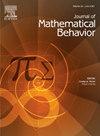作为数学对象的逻辑蕴涵:描述在入门证明课程中经历的认识论障碍
IF 1.7
Q3 EDUCATION & EDUCATIONAL RESEARCH
引用次数: 0
摘要
了解学生在基于证明的数学课程中遇到的认知挑战是支持他们应对这些挑战的必要前提。我们报告了对参加入门证明课程的七名STEM专业学生进行的一对临床访谈的结果。我们调查了他们在与面试官互动时所经历的认识论障碍,以及这些经验如何与他们将逻辑含义作为行动、对象或伪对象的处理联系起来。我们分享了七个学生的简介,描述了他们对逻辑含义的处理以及他们对相关认识论障碍的经历。这些资料表明,在与将逻辑含义视为对象的学生的互动中,与将动作或伪对象视为对象的学生的互动中,所经历的认识论障碍之间存在显著差异。结果表明,基于证明的数学课程应重点支持学生将逻辑含义作为数学对象的构建。本文章由计算机程序翻译,如有差异,请以英文原文为准。
Logical implications as mathematical objects: Characterizing epistemological obstacles experienced in introductory proofs courses
Understanding the cognitive challenges students experience in proofs-based mathematics courses is a necessary precursor for supporting them in meeting those challenges. We report on results from a pair of clinical interviews with each of seven STEM majors enrolled in an introductory proofs course. We investigate the epistemological obstacles they experienced in interaction with the interviewer and how those experiences might relate to their treatment of logical implications as actions, objects, or pseudo-objects. We share profiles for each of the seven students, characterizing their treatment of logical implications and their experiences of related epistemological obstacles. These profiles indicate marked differences between epistemological obstacles experienced during interactions with students who treat logical implications as objects, versus actions or pseudo-objects. Results suggest that proof-based mathematics courses should focus centrally on supporting students’ constructions of logical implications as mathematical objects.
求助全文
通过发布文献求助,成功后即可免费获取论文全文。
去求助
来源期刊

Journal of Mathematical Behavior
EDUCATION & EDUCATIONAL RESEARCH-
CiteScore
2.70
自引率
17.60%
发文量
69
期刊介绍:
The Journal of Mathematical Behavior solicits original research on the learning and teaching of mathematics. We are interested especially in basic research, research that aims to clarify, in detail and depth, how mathematical ideas develop in learners. Over three decades, our experience confirms a founding premise of this journal: that mathematical thinking, hence mathematics learning as a social enterprise, is special. It is special because mathematics is special, both logically and psychologically. Logically, through the way that mathematical ideas and methods have been built, refined and organized for centuries across a range of cultures; and psychologically, through the variety of ways people today, in many walks of life, make sense of mathematics, develop it, make it their own.
 求助内容:
求助内容: 应助结果提醒方式:
应助结果提醒方式:


